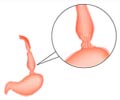A brief communication in the Journal of the National Cancer Institute says that three frequently used human esophageal adenocarcinoma cell lines used for research were from other tumor types
A brief communication published online January 14 in the Journal of the National Cancer Institute says that three frequently used human esophageal adenocarcinoma cell lines used for research were from other tumor types.
Two of the cell lines have been used in 11 U.S. patents and more than 100 published studies.The 13 established esophageal adenocarcinoma cell lines are important because of the limited availability of patient samples and animal models.
To determine the authenticity of all the available cell lines, Winand N.M. Dinjens, Ph.D., Department of Pathology, Erasmus MC, University Medical Center, in Rotterdam, the Netherlands, and colleagues used data from pathology archives and genotyping assays in collaboration with the primary investigators who established the cell lines.
Cell lines SEG-1, BIC-1, and SK-GT-5 were proven to be cell lines from other tumor types, including lung carcinoma, colorectal adenocarcinoma, and gastric fundus carcinoma, respectively.
"Experimental results based on these contaminated cell lines have led to ongoing clinical trials recruiting [esophageal adenocarcinoma] patients, to more than 100 scientific publications, and to at least three National Institutes of Health cancer research grants and 11 U.S. patents, which emphasizes the importance of our findings," the authors write. "Widespread use of contaminated cell lines threatens the development of treatment strategies for [esophageal adenocarcinoma]."
The cell lines whose authenticity was verified will be placed in public repositories to promote future research, according to the brief communication.
Advertisement
In an accompanying editorial, Robert Shoemaker, Ph.D., of the National Cancer Institute at Frederick in Maryland, questions this suggestion, pointing out that tissue of origin may not be important for all research studies. "…Given the knowledge that cancer is a heterogeneous disease," he writes, "one might question the rationale for any therapeutic maneuver that is based on studies conducted on a single cell line."
Advertisement
Source-Eurekalert
RAS















